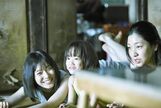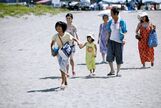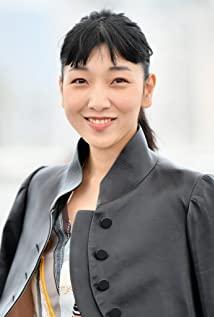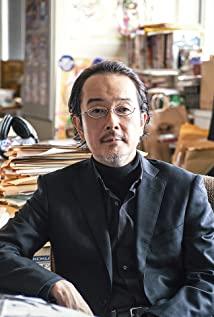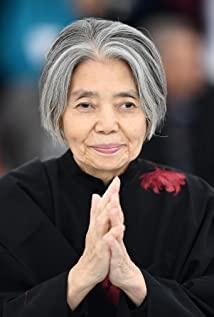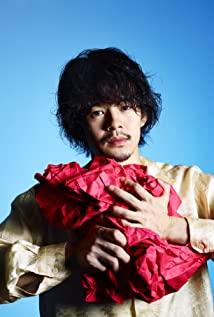When the movie ends, walking out of the door, a storm arrives unexpectedly, just like a scene in a movie, life is always full of uncertainty.
The audience can find a lot of the shadow of his previous work in the work "The Thief Family" that was just awarded to the Palme d'Or. The lack of parental responsibility makes children have to bear the pain of the adult world and become their atonement. With time, family generations become more and more alienated and indifferent. How to mend this guilty and emotional gap? It is not difficult to find that it is the strong escapist plot in the film by Hiroshi Kee. He can always find a completely "private" space to unfold the story. The most extreme is undoubtedly the isolated transit point between the world and heaven in "The Next Stop of Heaven", where everyone must let go of the past before they can enter the sacred and beautiful heaven. In "Nobody Knows", the narrow apartment is the entire life of the children, where they interpret "living" as a drama that is calm and shakes the world. In "Deeper Than the Sea", the wonderful emotional connection between father and son is completed in a children's public amusement facility, untie the knot, it turns out that our love for each other is deeper than the sea. The same is true of "The Thief Family". In a small ruined house surrounded by grass and plants, this is a refuge for six people. It is a place for them to escape from reality, leaning against each other and resisting loneliness.
Daily life is the core principle of Hiroshi Edema and family movies, and it must include the adult world's invasion of innocence. This seems to be a "private" theme, but just as all "private" literature points to the outside world, the inner turbulence and waves also allude to the outer repression. The original Japanese name in "The Thief Family" uses "万引", while the original Japanese name of another famous Oshima Nagisa's "Shinjuku Thief Diary" is "Mud Stick". The meaning of "Wan Yin" and "Mud Stick" are basically the same, but the former It is easy to take the sheep, the latter is the thief. The moral and ethical discussion of "stealing" in the movie is also very interesting. Zhi once said that the things put in the store do not belong to anyone. Xindai later said that if the store does not collapse, there is no problem with stealing. But it’s different in the children’s world. In the scenes where Xiangta and Yushu stole in the movie several times, the heavy moral oppression can be seen, which is far less fun and fun than the previous “actions”. After the old shopkeeper passed away and the shop closed, The moral foundation of theft also collapsed. In a society where courtesy and rules are so important in Japan, theft itself is a serious moral flaw, but Hirokazu Kee chose this breakthrough, allowing the audience to abandon traditional moral judgments and seek the emotional connection behind it. Nagisa Oshima’s “mud stick” is different, and it is also a breakthrough in social moral discipline. He also wants to establish a new world. The thieves who are caught again and again regard “stealing” not only as a catalyst for orgasm, but also as a catalyst for orgasm. Footnotes of red Japanese freshmen. "Wan Yin" has a reason after all, but "mud stick" has no reason.
Unlike Nagisa Oshima’s thieves, it is the form of Zhi Yuhe’s family that makes this thieves group more affectionate, but the thieves of Nagisa Oshima vainly try to escape from loneliness in the discussion of "sex" and complete the rebirth of life. One tries to splice life, the other resolves to be alone. It was Hirokazu that broke the absolutely personal narrative of the New Wave, and also extended the category of "private". This is not just for a specific person, but for him and his closest life circle, which is also the same. The structure of multiple "private" spaces, because in Shie Hirokazu's view, we cannot exist alone without the other, everyone has to know how to sort out his emotional bonds.
The self and the other are the core propositions in Japanese culture that values "relationship" so much. The typhoon in "Deeper Than the Sea" is destroying some connections, but it also re-establishes more important connections by accident. The search for "eternal moment" in "The Next Stop of Heaven" is actually the search for the closest relationship. Which one is more important than the blood connection and the emotional bond in "Father Like Son"? In "The Thief Family", the family is surrounded by high-rise apartments. In the super metropolis of Tokyo, the tiny six people try to hide and live by love. The six characters are opposite and unified. The audience can easily find three sets of settings, Zhi and Xiangtai, Hatsue and Aki, Shindai and Yushu. The film not only shows more interaction between them, but also hints that the former is through many details. The future of the latter, they are so similar, like a fate-like circle. When Yushu was brought home for the first time, Xindai looked at her through the glass door. With the same wound and experience, Xindai tried to interpret the true meaning of the role of "mother" with his own efforts. Chuzhi took in Aki, seemingly to avenge her ex-husband's unfaithfulness, but it actually helped Aki find her emotional focus, or the rebellious girl could not find a trace of emotional comfort in the space she lived in. Zhi and Xiangtai had too many secrets between each other, but they chose to be silent in such a tacit understanding. In the end, when Xiangtai couldn't help asking if he decided to leave him when he escaped, Zhi finally did not escape this time.
The father-son relationship is always the most complicated in the eyes of Hirokazu, because it is so difficult for men to confess their emotions, and the two are so close but so strange, but they seem to have difficulty understanding each other. A small opportunity. They will once again become the kind of closest partners. Xiangtai's growth is the establishment of a sense of responsibility, but this is what many adults lack. From being afraid that Yushu would take his place in the "father", to gradually knowing how to protect the "sister", I understood why my father chose to escape (whether it was his biological or emotional father). As early as "As a Father Like a Son", it was Hirokazu Kee who made his judgment clear. No matter what kind of father, the real father is the one who can bear the responsibility for transmission.
The biggest difference between "Thief Family" and Yuki Hirokazu's previous works is that he deliberately touched the dark side of contemporary Japanese society. As a matter of fact, as early as the golden age of Japanese movies, movies describing the lower-level subjects were all full of resentment towards social injustice. Such as Kurosawa Akira's "Wild Dogs" and "Heaven and Hell" in the dark place where the black market is rampant and everyone is sinking, not to mention the characters in Imamura Shohei's movies that linger like animals. In the Heisei era, Japan experienced the bursting of the economic bubble and the disintegration of clumps for generations. Inspiration and the main theme became the mainstream of the market. Any mention of the dark side of society would affect the mainstream acceptance. In "The Thief Family", Chu Zhi did not go to the nursing home, and after his death, he "cannot be cremated" and buried him in the backyard to continue receiving pension. In a highly aging Japan, it is undeniable that the elderly have to face psychological loneliness when they are satisfied with material things. They gradually lost the meaning of existence. The sigh of "Thank you" by Hatsue corresponds to the phrase "At least I won't die alone" she said before. She is lucky. As an isolated island, Japan seems to be lonely in heart. It is eternal destiny.
Women are another important theme in "The Thief Family." Four of the six masters are women. Their circumstances are undoubtedly the epitome of thousands of women. Domestic violence, marital betrayal, exploitation and consumption, and emotional abandonment are cold violence. It is that Hirokazu Ke does not attribute the cause to the patriarchal society, but presents a universal state of human nature. Although the images of women in the film are snobbish and mean, they Be stronger and braver. Compared with Hezhi, Shindai is more like the master of this family. She controls all major decisions. She alone bears all the responsibilities. For the happiness of her family, she can "kill" the person who reveals the secret. She has the courage. Tell Xiangtai the mystery of his life experience, because she trusts her family enough. It can be said that this woman who dared to love and hate supported this misty family. But women are more vulnerable. Ya Ji couldn't find her place in her native family. She was more eager for emotional support, and she was more open to a completely unfamiliar guest. In many cases, we do not need to speak, but to be listened to. If no one really cares about my inner feelings, what is the difference between home and prison. The movie ends when Youshu leans over the railing. The look she had before brought her to a completely strange family. Who else did she see this time? Are human beings so dark that they abandon their own flesh and blood? It was Hirokazu Kee who used "Nobody Knows" to reveal the complex emotional codes behind blood relationship and family relationship. However, the human heart is the eternal secret. We will never be able to solve the subsequent rational logic, but Yushu's mother will be after the loss of her daughter. There is a sense of relief, but this sense of relief does not save her already riddled with love.
Blood relationship is a very strange thing, because you can't choose since you were born. This is destined. You can change your name, nationality and even gender, but your biological parents have and only have the only answer. The family composition in "The Thief Family" completely abandons the existence of blood, until the truth of the film is revealed at the end, we find that they are all hurt by blood. It is Hirokazu Kee that has been deeply involved in the discussion of blood relationship, and his core point of view is clear. The blood relationship is far from the most trustworthy. What we need is a bond, which can come from blood, but it also transcends blood. Just as Xindai lamented, it is also the choice of God. The bond of bondage is far more important than blood relationship. We become people who rely on and appreciate each other. This is fortunate and the result of our efforts to change our destiny. Fighting fate with fetters is the ultimate answer to Zhi Yuhe overcoming loneliness. People are an isolated island in society, but everyone will be needed. We need a magical power to lead me out of the hopeless quagmire and experience the beauty of happiness.
The two family portraits in the film became the theme of the poster of "The Thief Family" released in China. One time was to watch fireworks, and one time the whole family went to Ohara Beach to play. For families whose purpose is "survival", this is even more precious. The blooming fireworks entrust people's beautiful blessings and beautiful hopes for the future. This is a power that transcends boundaries and classes, blooms in the sky, and everyone under this sky can enjoy it together. Fireworks are short-lived. The beauty of this moment is fleeting and beyond control, but at least it has bloomed. For the beauty of this moment, all the previous efforts have value. The sea is an infinite power. It washes the sins and purifies the soul. The family on the waves is carefree. At this moment, they are all children. They have forgotten all the troubles in life, washed away the lead, and finally can embrace freedom.
Going back to the details, Chiwa Shindai was eating cold noodles when it suddenly rained heavily. They seemed to have been enchanted by the rain, and they became intimate with each other after a long absence. Life will give you a lot of pain and pressure, but it will also give you surprises. This is an unexplainable secret. What is hidden in the heart is still floating in the wind and rain. In fact, it has long since turned into a silent piece of music. Just wait for a heavy rain to come.
View more about Shoplifters reviews



